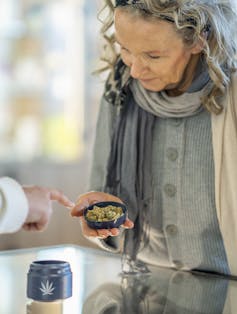More women are using medical cannabis – but new research shows barriers push some into ill
June 23, 2025
The number of women using medicinal cannabis is growing in New Zealand and overseas. They use cannabis treatment for general conditions such as pain, anxiety, inflammation and nausea, as well as gynaecological conditions, including endometriosis, pelvic floor conditions, and menopause.
However, their experiences with medicinal cannabis remain under-explored in research and overlooked in policy and regulation. As our work shows, they face several gender-specific barriers to accessing medicinal cannabis. Some of these hurdles lead women to seeking cannabis from illegal markets.
New Zealand introduced the medicinal cannabis scheme five years ago to enable access to legal, safe and quality-controlled cannabis products for any condition a doctor would deem suitable for a prescription.
A recent analysis found the number of medicinal cannabis products dispensed has increased more than 14-fold since 2020, with more than 160,000 prescriptions administered during 2023/2024.
In the first two years of the scheme, women were the primary recipients of medicinal cannabis prescriptions. Between 2022 and 2023, the number of prescriptions issued to female patients doubled to 47,633.
Our findings from a large-scale national survey show that although women perceive physicians as supportive of prescribing medicinal cannabis, they were less likely to have prescriptions than men. This is similar to findings from Australia.
Potential reasons include the cost of visiting health professionals, unpaid care-giving duties, lower workforce participation and a pay disparity – all creating barriers to accessing health services.
Women were also more likely not to disclose their medicinal cannabis use to others, citing it would be less accepted by society because of their gender.
Gendered risks in illegal cannabis markets
Our latest study aligned with Australia in finding that women often seek cannabis from illegal sources because of perceived lower prices. Many could not financially sustain accessing legal prescriptions because medicinal cannabis is not funded by New Zealand’s drug-buying agency Pharmac.
Study participants discussed the health risks of accessing illegal cannabis such as consuming products without knowing how strong they are or whether they have been contaminated with harmful substances.
They also characterised illegal cannabis markets as unsafe and intimidating for women, with little legal protection and the presence of predatory male sellers. Some even described gender-specific experiences of physical assault, intimidation and sexual harassment, particularly when cannabis buying occurred in drug houses or locations controlled by the seller.
Women accessing medicinal cannabis in illegal markets increasingly relied on female suppliers, viewing them as safer and more reliable. Some also helped connect others to these suppliers and used social media to warn other women of unsafe male suppliers. This created informal women-led support networks for access.
Accessing legal prescriptions

Getty Images
One of our recent studies found many women begin their journeys with medicinal cannabis online via social media, often leading them to cannabis clinics with a strong digital presence. Women are now a growing demographic for specialised medicinal cannabis clinics in New Zealand and in other countries.
Cannabis clinics have a reputation among medicinal cannabis consumers for being more knowledgeable and positive about treatments than general practitioners and other health providers. Women have been encouraged by positive online testimonies from other women using cannabis treatments for gynaecological and other conditions.
Female medicinal cannabis patients also described the financial burden of accessing a prescription, including consultation fees and the costs of products as barriers to access.
Their relationships with their GPs strongly influenced their decision to seek a prescription. Those with prior experiences of having their pain underestimated or misdiagnosed in mainstream care were more likely to source legal medicinal cannabis from cannabis clinics.
Policy and practice
The current scientific evidence for using medicinal cannabis for gynaecological conditions is still emerging. Clinical trials are under way in Australia to evaluate cannabis treatment for endometriosis and period pain.
Women’s reliance on online sources and personal recommendations to learn about medicinal cannabis highlights a gap in public awareness and government education about the legal prescription scheme. Hesitance to discuss and recommend cannabis treatment among GPs also persists as a barrier to access.
Online peer networks on social media platforms are promoting women’s agency and informing their decision making around medicinal cannabis, but also raise the risks of misinformation.
Although marketing of medicinal cannabis to women may improve their engagement with the prescription scheme, it may also put them in a vulnerable position where they are encouraged to pursue expensive treatment options which may not be effective.
The collective findings from our studies indicate complex financial, social and systemic factors affecting safe and equitable access to medicinal cannabis for women. To improve women’s engagement with New Zealand’s medicinal cannabis scheme, we suggest GPs should have informed and non-stigmatising discussions with female patients to explore when medicinal cannabis might be an appropriate treatment option.
Better access to good official consumer information about medicinal cannabis and greater investment in clinical trials for gynaecological conditions would also improve and support women’s decision making about their health.
Search
RECENT PRESS RELEASES
Related Post



